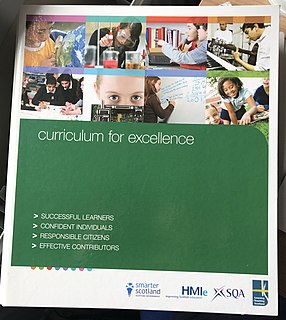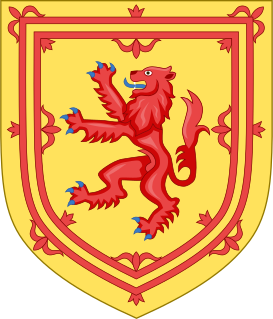External links
| | This article relating to education in Scotland is a stub. You can help Wikipedia by expanding it. |
| | This article related to government in Scotland is a stub. You can help Wikipedia by expanding it. |
The Scottish Further Education Unit (SFEU) was a development agency which supported the development of teaching and learning in the country. It was founded in 1985 as the Curriculum Advice and Support Team (CAST), and renamed to SFEU in 1991 when it became a government-sponsored non-departmental public body. In June 2009 SFEU merged with the Association of Scotland’s Colleges (ASC), Colleges Open Learning Exchange Group (COLEG) and Scotland’s Colleges International (SCI) to form Scotland’s Colleges.

A teacher is a person who helps students to acquire knowledge, competence or virtue.
Education in Scotland is overseen by the Scottish Government and its executive agency Education Scotland. Education in Scotland has a history of universal provision of public education, and the Scottish education system is distinctly different from those in the other countries of the United Kingdom. The Scotland Act 1998 gives the Scottish Parliament legislative control over all education matters, and the Education (Scotland) Act 1980 is the principal legislation governing education in Scotland. Traditionally, the Scottish system at secondary school level has emphasised breadth across a range of subjects, while the English, Welsh and Northern Irish systems have emphasised greater depth of education over a smaller range of subjects.
The Workers' Educational Association (WEA), founded in 1903, is the UK's largest voluntary sector provider of adult education and one of Britain's biggest charities. The WEA is a democratic and voluntary adult education movement. It delivers learning throughout England and Scotland. There was a related but independent WEA Cymru covering Wales, though it is now known as Adult Learning Wales since a merger in 2015 with YMCA Wales Community College.
Educational technology is the combined use of computer hardware, software, and educational theory and practice to facilitate learning. When referred to with its abbreviation, EdTech, it is often referring to the industry of companies that create educational technology.

The University of the Highlands and Islands is a tertiary university composed of Academic Partners which are the 13 colleges and research institutions in the Highlands and Islands of Scotland delivering higher education. Its executive office is in the former Royal Northern Infirmary building in Inverness.

Learning and Teaching Scotland was a non-departmental public body of the Scottish Government, formed by the merger of the Scottish Consultative Council on the Curriculum (SCCC) and the Scottish Council for Educational Technology (SCET). It was the main organisation for the development and support of the Scottish curriculum, and was at the heart of developments in Scottish education until its merger with Her Majesty's Inspectorate for Education to form Education Scotland in 2011.

The Royal College of General Practitioners (RCGP) is the professional body for general (medical) practitioners in the United Kingdom. The RCGP represents and supports GPs on key issues including licensing, education, training, research and clinical standards. It is the largest of the medical royal colleges, with over 50,000 members. The RCGP was founded in 1952 in London, England and is a registered charity. Its motto is Cum Scientia Caritas – "Compassion [empowered] with Knowledge."
The Learning and Skills Development Agency (LSDA) was a publicly funded body in the United Kingdom that supported further education in England. At the end of March 2006 its functions were divided into the Quality Improvement Agency (QIA) and the Learning and Skills Network (LSN) and its trading subsidiary, Inspire Learning, better known by its brand name the Centre for Excellence in Leadership was spun-out. Inspire Leadership and QIA were re-absorbed into the same corporate entity, the Learning and Skills Improvement Service on 1 October 2008.

The Enterprise, Transport and Lifelong Learning Department (ETLLD) was a former Scottish Executive department responsible for economic and industrial development, further and higher education, skills, lifelong learning, energy, transport and digital connectivity until 2007.
Reid Kerr College was a further education college in Paisley, Renfrewshire. According to its website, it was one of the fastest growing further education institutions in Scotland with over 20,000 students, 650 staff and 300 courses. Reid Kerr offered a range of courses in a variety of areas including business & management, construction, computing & e-commerce, engineering, hospitality, hairdressing & beauty, science, sport, health & care, creative arts, languages, communication and support for learning. Courses were available on a full-time, part-time, day or evening basis or by distance learning and covered a range of levels from Highers, NC, HNC and HND to professional qualifications. The College also provided training and staff development customised to meet business and commercial needs and assists in the development and growth of businesses.

Edinburgh's Telford College was a further education college in Edinburgh, Scotland. In October 2012, the college merged with Jewel & Esk College and Stevenson College to form a new entity called Edinburgh College. The Telford College campus, in the Granton area of north Edinburgh, now forms one of the four main sites of the new college and is called Edinburgh College .
Community education, also known as community-based education or community learning & development, is an organization's programs to promote learning and social development work with individuals and groups in their communities using a range of formal and informal methods. A common defining feature is that programmes and activities are developed in dialogue with communities and participants. The purpose of community learning and development is to develop the capacity of individuals and groups of all ages through their actions, the capacity of communities, to improve their quality of life. Central to this is their ability to participate in democratic processes.
Skills Development Scotland (SDS) is the national skills agency of Scotland. It is an executive non-departmental public body of the Scottish Government.

John Wheatley College was founded in 1989 and had its main campuses in Easterhouse and Haghill in Glasgow.
Grahame Smith is a Scottish former trade unionist, who served as General Secretary of the Scottish Trades Union Congress (STUC).
ASDAN is a British education charity and awarding organisation, headquartered in Bristol. It provides curriculum programmes and qualifications to help young people develop knowledge and skills for learning, work and life. It began as a research project of the University of the West of England in the 1980s, and was formally established as an educational charity in 1991.
The Scottish Credit and Qualifications Framework (SCQF) is the national credit transfer system for all levels of qualifications in Scotland. The Scottish Credit and Qualifications Framework Partnership promotes lifelong learning in the country. Through the SCQF, learners can gain a better understanding of qualifications and plan their future learning.

Yellowhead Tribal College is an educational institution located in Edmonton, Alberta, Canada which is run by four member nations of Treaty 6 with the four members being Alexander First Nation, O'Chiese First Nation, Sunchild First Nation and Alexis Nakota Sioux Nation.

Education Scotland is an Executive Agency of the Scottish Government, tasked with improving the quality of the country's education system.

The HALO Urban Regeneration, also known simply as The HALO, is a Scottish urban regeneration and business start-up support company, founded, based and headquartered in Kilmarnock, East Ayrshire, Scotland. The HALO Urban Regeneration was founded by entrepreneur Marie Macklin CBE in 2006 as HALO Urban Regeneration Company Ltd., having announced the project a few years prior to official funding and creation of the HALO Kilmarnock.